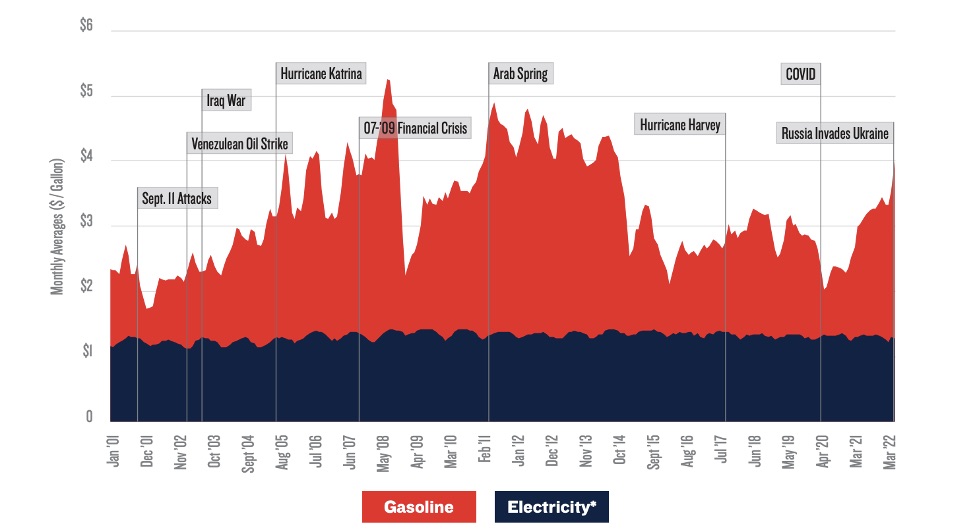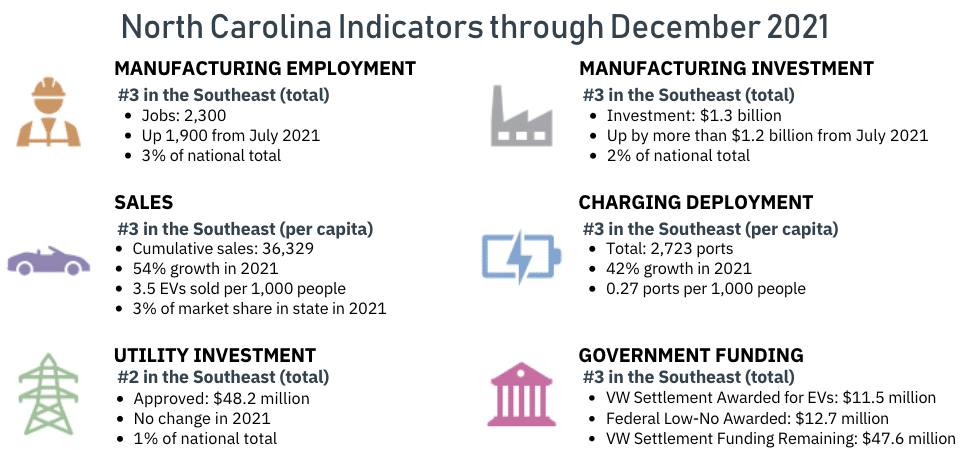North Carolina’s governor, Roy Cooper, has an ambitious vision to decarbonize the economy, unleash a clean tech job boon, and address the climate crisis - all while centering equity along the way.
Stan Cross | May 11, 2022 | Clean Transportation, Electric Vehicles, Energy Justice, Energy Policy, North CarolinaA cornerstone of North Carolina Governor Cooper’s ambitious decarbonization vision is charting a zero-emission transportation future by increasing the total number of zero-emission vehicles in the state to at least 1,250,000 and in-state sales of new vehicles to 50% zero-emission by 2030. This is the right initiative at the right time as:
- The transportation sector is our leading carbon emitter and deserves our urgent focus. The science is crystal clear that if the world drives transportation emissions to zero by 2050, we can avert the direst climate change impacts.
- Car, truck, and bus tailpipes spew ground-level nitrous oxide and PM2.5 emissions undermine public health. A recent study by the American Lung Association shows that eliminating tailpipe emissions will avoid 3,200 premature deaths in North Carolina and deliver the state $35.3 billion in health benefits over the next 30-years, benefiting lower-income and communities of color the most.
- Russia’s war on Ukraine has again reminded us, that our nation’s oil dependency creates national security risks and bounds our economy to the global oil market’s extreme volatility. These risks and volatility are eliminated with electric vehicles and other zero-emission transportation technologies.
GASOLINE AND ELECTRICITY PRICES:
JANUARY 2001 – MARCH 2022

Our oil-dependent transportation system needs a zero-emissions overhaul. The challenge is figuring out how to do it rapidly, economically, and equitably as climate change, public health, and national security crises mount.
The Planning Process
In North Carolina, zeroing out car, truck, and bus emissions has been tasked to the Department of Transportation (NCDOT). The NCDOT launched the multi-stakeholder Clean Transportation Plan process to deliver a plan to the Governor by April 2023. This process includes a stakeholder advisory committee, on which I serve, comprised of advocates, academics, industry representatives, and state agencies. The advisory committee will oversee workgroups where over 150 stakeholders have volunteered to work out the plan’s details. Workgroups will meet six times over six months to determine priorities to advance five clean transportation areas:
- Light-Duty Zero Emissions Vehicles
- Medium and Heavy-Duty Zero-Emission Vehicles
- Fleet Transition
- Vehicle Miles Traveled Reduction
- Clean Transportation Infrastructure
Workgroups must examine their focus area across six considerations and outcomes:
- Equitable access
- Education and outreach
- Incentives and financing
- Economic and workforce development
- Health impacts
- Policies and programs
This process design seeks to ensure that each priority is examined holistically and that the cumulative impacts of plan priorities are understood and communicated to the public and decision-makers. Success will chart an aggressive and actionable multi-agency path toward zero-emission transportation.
Centering Equity
What separates this planning effort from previous state plans in North Carolina and across the region is that this one requires NCDOT to center equity. Governor Cooper included this requirement in his Executive Order 246 in full awareness that centering equity is challenging and essential. Centering equity means engaging early and often with historically underrepresented and underserved communities, including low-to-moderate income, rural, and minority populations, to enable these diverse communities to champion their needs, opportunities, and priorities. It’s about letting go of assumptions by giving these communities agency over plan outcomes intended to benefit them. It’s about striving for inclusive planning and implementation above all else.
Tellingly, there are no replicable examples of comprehensive equity centering in state transportation planning for NCDOT to draw from, though there are lessons learned from previous attempts that can inform the process. Successfully centering equity in the Clean Transportation Plan will provide a much-needed example of how states can use the transition to zero-emission transportation to correct historic inequities and injustices that undermine community health and prosperity and have often resulted from an intentional lack of community engagement in transportation planning and implementation.
Getting this plan right will require widespread participation by underrepresented and underserved community members and advocates that work within these communities. To support participation, money has been raised to provide stipends that individuals and organizations can access to compensate for their time (email me at [email protected] for information).
North Carolina Residents: Get Involved
Make your voice heard! Every North Carolinian has a stake in the transition to zero-emission cars, trucks, and buses, increased access to mass transit, and more walkable and livable communities. Everyone deserves access to the health, economic and environmental benefits that will come from these shifts. Along with centering equity, Governor Cooper mandated that the Clean Transportation Plan “shall include best practices for community engagement, meaningful dialogue, and efficient mechanisms to receive and incorporate public input into agency decision-making.”
Take the Survey
NCDOT has posted a Clean Transportation Plan survey and seeks participation from as many North Carolinians as possible. The survey will inform future public information sessions, workgroup action plans, and the final Clean Transportation Plan.
Get Up to Speed
On April 1, 2022, NCDOT hosted a webinar to inform stakeholders about the Clean Transportation Plan process. View a recording of the webinar.
Ongoing Public Participation
Over the next six months, the work done in workgroups will be available online for public comments, questions, and insights allowing for public participation in the plan drafting process.
In-person and virtual public engagement events throughout the rest of the process will be interactive, allowing for questions, answers, and discussion. Keep an eye on the NCDOT’s Clean Transportation Plan website. More information will be made available as the process is set up to enable this public engagement.
Wide Engagement Will Yield Success
North Carolina has the opportunity to create an actionable plan that will guide the state toward a zero-emission transportation future in support of a transformative decarbonized economy. The state has made strides across a number of electric transportation indicators but remains far from the goals of 1,250,000 zero-emission vehicles by 2030. The recent announcement of VinFast’s $4 billion electric vehicle manufacturing plant outside Raleigh (not included in the year-end numbers below) demonstrates that in addition to addressing climate change, improving public health, and strengthening national security, accelerating the shift to zero-emission transportation creates jobs.

The steep climb out of our fossil-fuel-dependent past will challenge every sector of the economy, political office, agency, and consumer. Like any challenging climb, success comes from taking one step after another. The Clean Transportation Plan is a critical next step for North Carolinians, the success of which requires government accountability and our collective participation.
Electrify the South is a Southern Alliance for Clean Energy program that leverages research, advocacy, and outreach to promote renewable energy and accelerate the equitable transition to electric transportation throughout the Southeast. Visit ElectrifytheSouth.org to learn more and connect with us.